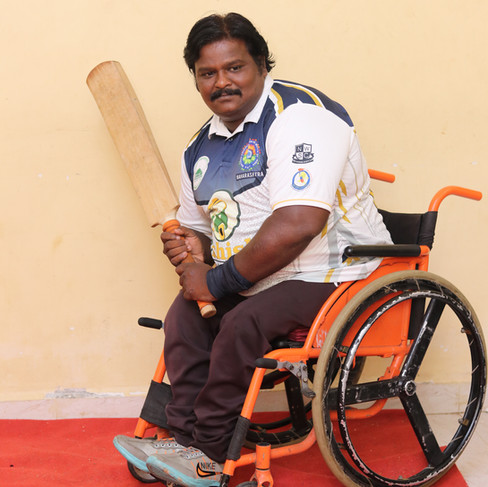
Widely regarded as India’s most successful wheelchair cricket captain, Ramesh Sartape has not only made his mark but paved the way for disabled individuals in the future to pursue a career in sport. Suffering from polio, the 38-year-old did not let his limitations come between his love for the game and has enjoyed a successful career in the Indian wheelchair cricket team.
In this exclusive interview with SPOGO, Ramesh Sartape shares his cricketing journey, expectations from the 2nd T20 Asia Cup, overcoming challenges, getting support from governments and private institutions and his future goals.
Being born and brought up in India, everyone has cricket in their blood. I have polio in both legs so I used to walk on crutches earlier when there used to be Divyang cricket for the disabled Dadar Shivaji Park which was started by Ajit Wadekar. Watching them practice gave me a lot of motivation and I saw that people with worse disabilities than mine were also participating so I went there and started playing. I used to hold crutches with one hand and bat with the other and run between wickets with crutches. Eventually, I started gaining knowledge and experience in cricket.
While browsing on Facebook I came across Mr. Haroon Rasheed's profile and saw that he works with Divyang cricket. I contacted them and found out that he is trying to promote wheelchair cricket. The Divyang Cricket Control Board of India runs wheelchair cricket along with deaf and dumb, blind and women's cricket. He informed me that there are trials in Agra and I should participate. I told him that I don't have a wheelchair after which he told me to just show up and assured me that he will take care of it. When I went there it inspired me to start my wheelchair cricket journey which has taken me to an international level.
India's wheelchair cricket team defeated Bangladesh at home by 3-0 and were also runners-up in the Asia Cup which was held in Nepal. The International Wheelchair Council has given Pakistan permission to host the 2nd T20 Asia Cup. I truly believe that the mistakes we made in the 1st Asia Cup will not be repeated. India is widely considered the strongest wheelchair team and our team will try our level best to make sure we become victorious.

The first time I wore the Indian jersey during the Bangladesh series remains one of the most special moments in my career. If we win the upcoming Asia Cup under my captaincy, then it will be a major milestone in wheelchair cricket and will be my biggest achievement.
The initial challenges in wheelchair cricket were access to the grounds and buying kits. We used to practice in Malad and whenever we tried to practise on some grounds, the management would question us about the tires damaging the pitch. We also need active wheelchairs which only start at 30,000-40,000 and it’s unaffordable. While travelling for tournaments we face difficulties in the journey. Even in the first class or sleeper coach in trains, our wheelchair does not have enough space to move around because of which the only option we have is the coach for the disabled.
In terms of accommodation, many places in India are not wheelchair friendly as there is no option of a ramp and they will only have steps to get to places. While playing on the grounds, the washrooms are also not accessible by wheelchair. In order to play wheelchair cricket an individual has to go through a lot of challenges.

Firstly the government doesn't give us much support, usually when we have a tournament then we have to seek support from private investors. BCCI recently announced that they are making a differently able committee which will hopefully support wheelchair cricket in the future. Secondly, future wheelchair cricketers need to have basic amenities and benefits that we aren’t receiving so that it will encourage more disabled individuals to take up the sport.
Yes, I want to be a coach in the future. Being the captain of the wheelchair cricket team, we suffer the same problems everywhere we go. We tend to arrange our own transportation, stay, and cricketing equipment and we also play tournaments without much support. My future goal is to have better facilities for wheelchair cricketers and most importantly make them financially stable. In short, I don't want the future generation to go through the same problem that I have experienced.










Superb...